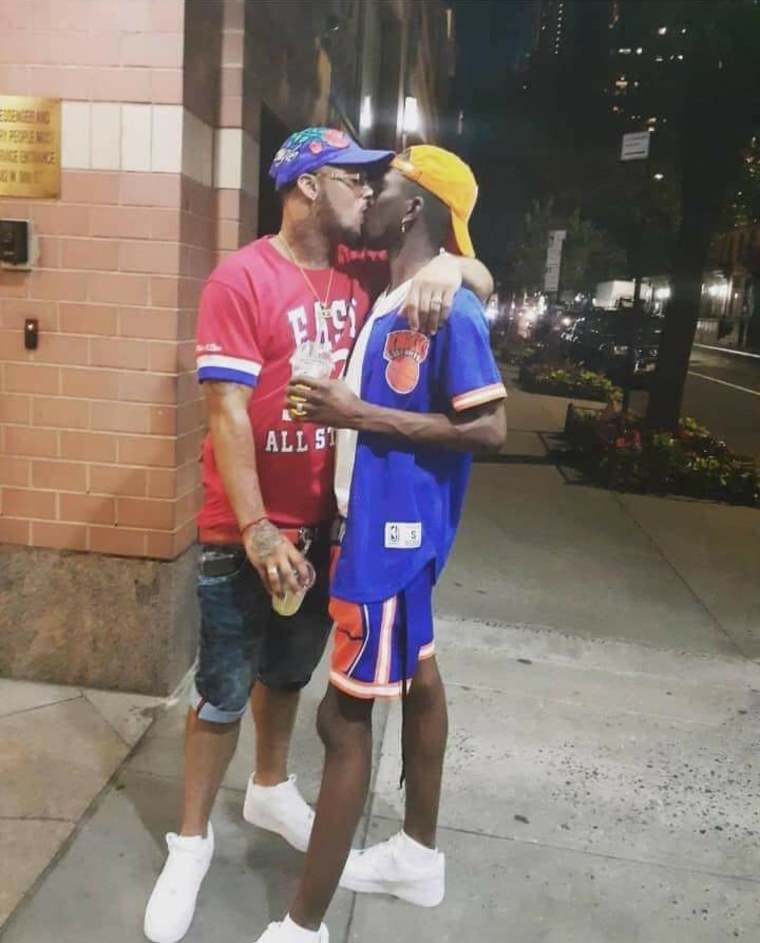In Puerto Rican Restaurant in NYC }{ Server Harrases Gay Couple }{
A gay New York City couple say they were harassed and asked to leave a restaurant this month because of their sexuality.
Nelson Ayala and Jamel Brown Jr., who live in the Bronx, say the incident happened at the nearby Puerto Rican restaurant La Isla Cuchifrito. They say a woman who worked behind the counter made homophobic remarks after they had ordered.
 |
| Ayala, left, with Jamel Brown Jr., right.Courtesy Nelson Ayala |
In a video taken by Ayala and shared with NBC News, the employee can be heard saying “hombre, mujer” repeatedly, which translates into “man, woman.” She then says, in a mix of English and Spanish, “Everything correct my family: hombre, mujer, nino y nina,” adding the Spanish words for boy and girl. In a separate video shot by Ayala, the woman can be heard repeatedly apologizing.
The restaurant has since fired the employee, and Boyd Cole, a relative of the owner, said, “In no way do they condone the comments made by their former employee.”
Ayala, however, said that he and Brown don’t accept the apology.
“They apologized, and they offered us a meal, but this is not something that should just go away,” he said.
Because the incident happened in New York City, the men have legal recourse.
“New York state law and New York City law prohibit sexual orientation discrimination in public accommodations such as restaurants,” Richard Saenz, an attorney at the LGBTQ civil rights group Lambda Legal, told NBC News. “In NYC, if you experience discrimination, you have a right to file a complaint with the NYC Commission on Human Rights.”
Ayala and Brown said they plan to file such a complaint.
 |
| N. Carolina cities begin passing historic LGBTQ nondiscrimination laws |
While those who are discriminated against in businesses and other public accommodations have recourse in New York City and New York state, that’s not the case across the country. There are currently 21 states, including New York, that explicitly prohibit discrimination based on sexual orientation and gender identity in state law, with five more that interpret their existing sex discrimination prohibitions in public accommodations to include discrimination based on sexual orientation and gender identity, according to the Movement Advancement Project, an LGBTQ think tank. The project also notes that in states without state-level protections, municipalities may provide nondiscrimination protections at a local level.
Last month, for example, NBC News reported on a same-sex couple in North Carolina who were told by an employee of a wedding venue in Winston-Salem that the business does “not host same-sex marriage ceremonies.” Rick Su, a law professor at the University of North Carolina, said the couple had little hope of legal recourse.
“North Carolina has no state law on public accommodations not related to disabilities and no anti-discrimination laws protecting LGBT identity,” Su told NBC News at the time. “Given there is no federal law protecting LGBT [people] either, this would mean that the wedding venue is free to discriminate.” And until this month, North Carolina municipalities were unable to pass local ordinances banning such discrimination, though that has recently changed. Following the expiration earlier this month of a yearslong moratorium, several North Carolina cities and towns passed their own LGBTQ-inclusive nondiscrimination ordinances.
While advocates are hopeful the Biden administration will pass additional nondiscrimination protections, until that happens there will continue be a patchwork of laws across the U.S. when it comes to anti-LGBTQ discrimination protections in public accommodations. To help LGBTQ Americans navigate this patchwork, several advocacy groups offer free resources: Lambda Legal has a legal help desk, while Movement Advancement Project has a detailed policy map.
As for Ayala and Brown, they said there have been rallies with LGBTQ activists outside La Isla Cuchifrito, and they hope the protests will encourage businesses owners and managers to provide better training for employees and let the community know that if someone else is discriminated against, “this will be the outcome.”
“We will all come together as one, and will let people hear our voices,” Ayala said.
{{ NBC Out }}

Comments